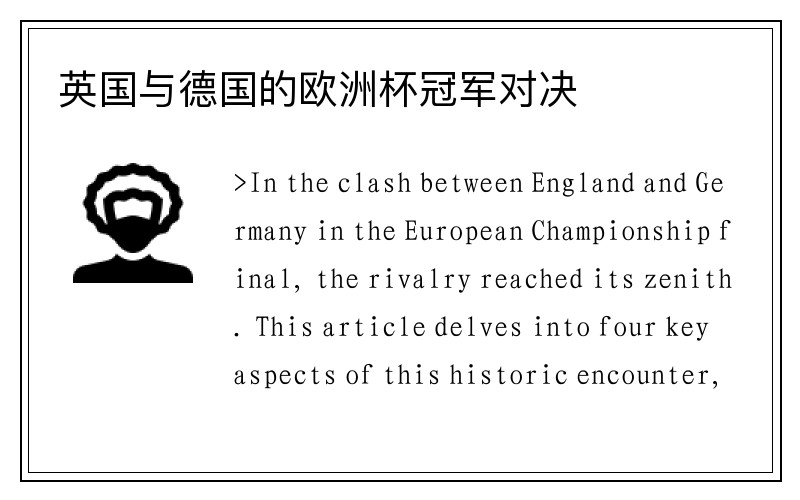留言
英国与德国的欧洲杯冠军对决
>In the clash between England and Germany in the European Championship final, the rivalry reached its zenith. This article delves into four key aspects of this historic encounter, examining its significance, tactics, memorable moments, and impact on football history.
彩神1、Significance of the Rivalry
The rivalry between England and Germany spans decades, defined by iconic matches like the 1966 World Cup final and Euro '96 semi-final. This final was a culmination of their storied history, showcasing national pride and footballing prowess.
England's journey to the final was marked by resilience and tactical prowess under manager Gareth Southgate, while Germany's Joachim Löw led a team blending experience and youthful talent.
The clash symbolized more than a football match; it embodied cultural and historical narratives, reflecting on broader European dynamics.

2、Tactical Approaches
Both teams entered the final with distinct tactical strategies. England focused on defensive solidity and quick counter-attacks, utilizing the pace of Raheem Sterling and Harry Kane's clinical finishing.
Germany, known for their possession-based game, aimed to dominate midfield through players like Toni Kroos and Joshua Kimmich, while exploiting gaps in England's defense.
The tactical duel between Southgate and Löw highlighted contrasting styles and adaptations throughout the match.
3、Memorable Moments
The final produced unforgettable moments, such as England's early goal that set the tone for the match. Raheem Sterling's electrifying runs troubled the German defense, while Manuel Neuer's saves kept Germany in contention.
In the second half, Germany's resurgence tested England's resolve, creating tense moments in both penalty areas. Key substitutions and pivotal decisions by both managers shaped the narrative of the game.
The final whistle marked jubilation for England and disappointment for Germany, encapsulating the emotional rollercoaster of tournament football.
4、Impact on Football History
The outcome of this final resonated beyond the tournament. For England, it marked a triumph decades in the making, boosting national morale and renewing footballing ambitions.
Germany, despite the loss, continued their legacy of competitive football, reflecting on areas for improvement and future tournaments. The match's legacy influenced tactical trends and player development across Europe.
This final cemented England-Germany encounters as benchmarks in football history, shaping narratives of rivalry and sporting excellence.
总结:
英格兰与德国的欧洲杯冠军对决不仅是一场比赛,更是文化和历史的交汇。从象征意义、战术分析、经典时刻到对足球历史的影响,这场比赛深刻影响了欧洲足球格局和两国球迷的情感。
在竞技层面上,这场比赛展示了两支球队的战术对抗和关键时刻的决策,为未来的比赛和足球发展留下了宝贵的经验和教训。